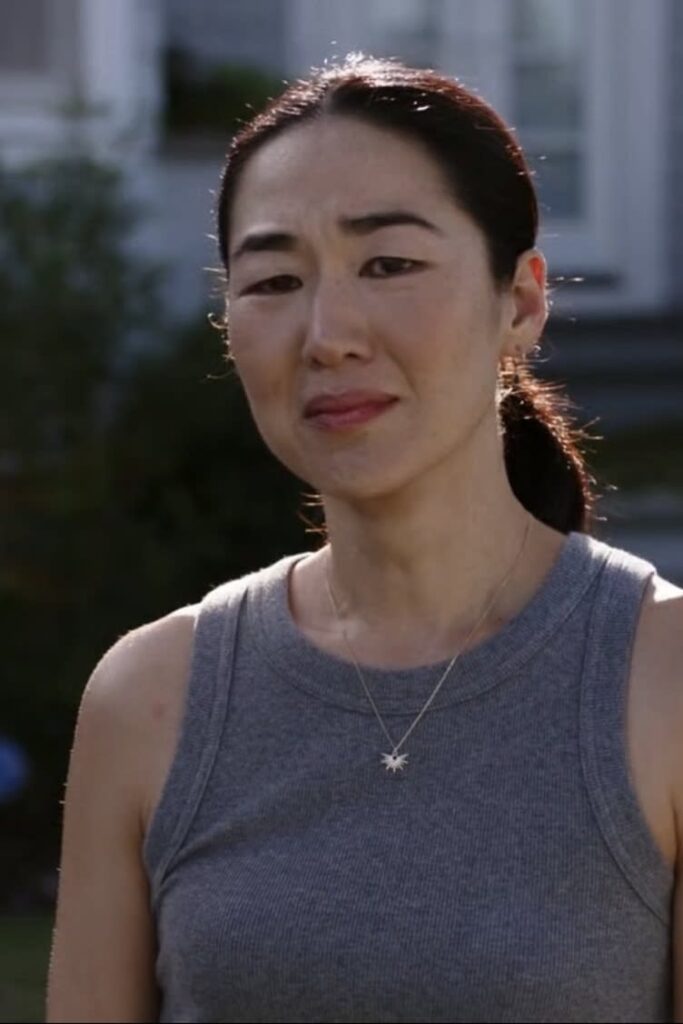While fans of The Summer I Turned Pretty love to debate Team Conrad vs. Team Jeremiah, there’s a darker, far more consequential character who deserves scrutiny — Adam Fisher.
Many were reacting viscerally to the messiness and fallout of Belly and Jeremiah’s engagement during The Summer I Turned Pretty Season 3 Episode 3.
However, the hour pulled back the curtain on just how quietly destructive Adam’s emotional abuse has always been, and how it thrives primarily because he goes unchecked.
The Summer I Turned Pretty’s Real Villain Isn’t Who You Think
Emotional abuse is often tricky, especially when the perpetrator is a narcissistic parent.
People don’t always take cutting comments or biting remarks as seriously as they would physical harm.
It’s been fascinating to watch how deeply Adam Fisher’s emotional base influences so much of this series, given its profound impact on both of his sons and their behavior.
“Last Supper” was a messy hour that upped the ante and set the groundwork for the remainder of the season, including a finale where we anticipate seeing Belly truly make her real and final choice.
But the actual dinner scene was memorable for so many reasons. Primarily, it served as a painful reminder of how emotional abuse can so often thrive because of the silence.

It’s insidious, operating in the shadows undetected or unchallenged, and sometimes making it feel infinitely more damaging.
Adam Fisher has been consistently terrible. It’s his abusive tendencies that likely were at the root of his and Susannah’s divorce, because it went so much deeper than just infidelity.
And the “Last Supper” places a spotlight on Adam and his ways — subsequently giving viewers more insight into the Fisher brothers, too, by proxy, as a way of fully understanding why they both function as they do.
Silence is the Enabler of Abuse

Adam’s cavalier approach to Susannah’s dedication ceremony was unsettling from the moment he appeared onscreen.
However, we also witnessed how he subjected Laurel to the same belittling and passive-aggressive behavior that we had seen before with others.
He immediately draws a comparison to Laurel and Susannah, criticizing the former for her skill set in organizing a ceremony he had no part in.
And instead of Laurel or anyone calling him out on it and holding him to account, there’s just that polite but uncomfortable silence. When people talk about “silence is complicity,” it’s exactly what they mean.
Because it doesn’t lessen the blow or nip troubling behavior in the bud, it allows it to continue thriving, spreading, and, in this case, continually inflict damage.

When Laurel said she would handle the bill at the restaurant, Adam resorted to that narcissistic showmanship that had him subconsciously proving a point by ordering what was inarguably the most expensive thing on the menu.
Why? Because it would either put Laurel out, making her dig deeper into her pockets when it’s evident that she doesn’t make as much as he does, or it would push her to ask for his help so he could play savior, stroke his ego, flaunt his funds, and cut Laurel down again.
We also saw him spend most of the dinner cutting Laurel off at every conceivable turn. He spoke over her, dismissed everything she said, and consistently wanted to be at the center of attention—his chauvinism and sexism on clear display.
The Heir and the Spare — How Adam Damages Conrad and Jeremiah
And then we once again saw firsthand the type of emotional abuse he casually inflicts on the Fisher boys and has inflicted on them their entire lives.

Of course, it’s an interesting double-edged sword that could fall under the radar for some, particularly in terms of its damaging effects on both Conrad and Jeremiah.
Adam’s every reference to Conrad in the entire episode centered on his studying medicine.
What’s telling is that there’s no clear interest in what Conrad is doing — he isn’t even correct in how he refers to Conrad on his path of studying medicine — only that he’ll be a doctor “soon.”
It’s also telling that Adam either doesn’t know or care that Conrad was able to attend his mother’s dedication after all, because he lost his internship position.

In short, it serves as one of many reminders that for Adam, Conrad’s only value is in what he can achieve.
Meanwhile, the dinner also displays Adam’s degradation of Jeremiah.
It’s not so much what he says, but rather how he chooses to say it — with the intonation of someone who doesn’t see the value in this particular child at all.
Demeaning, condescending, and once again with the air of “Why can’t you be like your brother?” Or more specifically, “Why can’t you be like my idolized version of your brother?”
Jeremiah and Conrad Vary in Trauma Responses to Abuse

The only thing more unsettling than Adam’s demeaning toast was watching the visible discomfort at the table, accompanied by silence.
Because the silence is just as much at the root of what amounts to the Fisher boys’ trauma as Adam’s emotional neglect and abuse.
Silence is why Conrad represses his feelings, and as a result, he struggles deeply with expressing himself and sharing his emotions. And silence is Jeremiah can act out or desperately attempt to cling to attention when he’s in a room.
For Conrad, the silence serves only as a reminder to repress his feelings and refrain from saying anything that might disrupt the moment. And for Jeremiah, the silence cuts deeply for a child who was ignored and neglected.
Both boys are clearly the product of an abusive, toxic parent and another who unwittingly enabled it, and I sometimes wish the series dug deeper into the generational trauma of this series. The content is plentiful and there for the taking.
Heir, Spare, Scapegoat

Via Adam, his two sons are such a prime example of the “heir/spare” mentality that’s so damaging. He constantly pits his sons against each other and holds them to performance-based standards only.
Conrad’s academic success is merely a reflection of how great Adam is, in his mind. He doesn’t see beyond the image of what Conrad could be.
Adam holds Conrad to impossible standards that he can never reach, thus placing him on a pedestal and compelling Conrad to perform consistently to meet those expectations.
Via the burden of having to be great, Conrad’s anxiety and unraveling are a common theme of the series. His worth is only tied to being perfect, and he isn’t perfect, which makes him spiral whenever he falls short.
Conrad’s fear of failure, emotional distance, repressed emotions, depression, and self-sabotage are all shaped by a toxic father like Adam, who shapes Conrad’s entire identity.
Adam Is a Realistic Portrayal of Narcissistic Parenting

Adam’s complete dismissal of Conrad’s emotional suffering under the weight of trying to make his father proud is damning.
Conrad’s panic attacks are strongly a result of trying to save face with a father who doesn’t want or care about Conrad’s feelings, only how he can serve and make him look good.
Conrad internalizes everything and tries to be conflict-avoidant because he has been on the receiving end of Adam’s belittlement and criticism if he doesn’t perform to the degree Adam desires.
The series outlines that well.
But subsequently, we see that emotional abuse manifests differently but just as strongly in Jeremiah.

While Conrad was overburdened and crushed under the weight of Adam’s expectations and pressure, Jeremiah was overlooked and erased by Adam’s emotional neglect.
Conrad internalizes, whereas Jeremiah overcompensates and performs. Throughout the series, we see that Jeremiah’s only value within the Fisher family is tied to putting on a show and performing.
He often bears the burden of people-pleasing and managing everyone’s emotions.
Jeremiah entertains Susannah and tries to make her happy; he puts on a false air of confidence and persona as the “fun” one because the only emotions he ever has access to expressing in the Fisher household are happy ones that benefit those around him.
Adam simultaneously sets Jeremiah up to perform and be easygoing to get his attention. Then he derides him for the same traits, the only ones he had shown interest in or valued within him.
Jeremiah has to be agreeable and stay “on” all the time to have any shot of seeing affection or attention.
The Fisher Brothers Are Classic Examples of Trauma Responses

His emotional invisibility results in him facing the brunt of managing his father’s constant indifference and degradation, his brother’s repressed pain, and his mother’s happiness, but often at the expense of his own emotions.
Ironically, Adam fosters an environment where Jeremiah simultaneously holds the responsibility of managing and navigating everyone’s emotions while also being dismissed as irresponsible and immature.
It was particularly glaring when Susannah fell ill. We learned that Jeremiah did the bulk of taking care of her and the household — only for Adam to cut Jeremiah down during legal matters about the house and with other decisions post-Susannah’s death.
Despite seeing that there’s more depth to Jeremiah when it comes to serious matters, Adam reaffirms that his son is “unserious.”
Emotional Abuse and Silence Are Dangerous Bedfellows

It’s even evident in how Adam makes no space for either son and their grief over losing their mother.
One could argue that both brothers have been crawling out of the dredges of that unprocessed grief since it happened, and yet with zero emotional support.
And thus, neither of them has been able to cope properly since then.
Conrad internalizes and represses. Jeremiah internalizes, burns out, and then explodes.
Adam? He stokes the flames. And everyone else? They stand amid the scorched marks and grimace.
If there’s one message to take from this episode, it’s this: Emotional abuse doesn’t always shout. Sometimes, it whispers, and still wrecks lives.
Watch The Summer I Turned Pretty Online
If you read this whole thing, we appreciate you, and we’d love to know how you feel about this topic too!
Please consider leaving a comment or sharing it with someone who might enjoy it too. Small actions, big impact — that’s how you help sites like ours thrive.
The post The Summer I Turned Pretty Exposes How Emotional Abuse Thrives in Silence appeared first on TV Fanatic.

